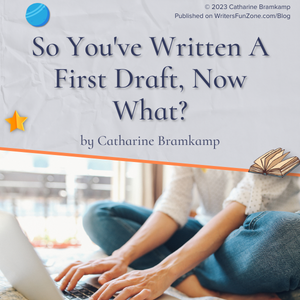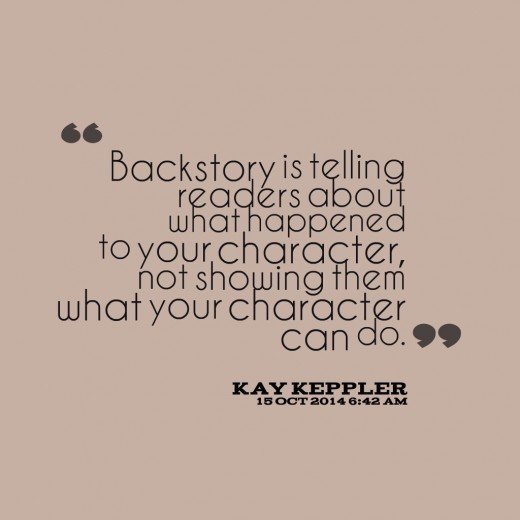So You’ve Written A First Draft, Now What? by Catharine Bramkamp
 Let’s welcome back monthly columnist Catharine Bramkamp as she shares with us “So You’ve Written A First Draft, Now What?” Enjoy!
Let’s welcome back monthly columnist Catharine Bramkamp as she shares with us “So You’ve Written A First Draft, Now What?” Enjoy!
***
You did it! You wrote up 50,000 words during NaNo and you are not only exhausted but currently squinting at the living room wondering if a well lit holiday tree will distract the family from the five inches of dust on the backs of all the chairs.
They will not notice.
And you, you marvelous author, will take December off.
You’ve probably read, and forgotten countless writing articles suggesting that after an intense session with a novel or any work, an author must take a break.
You think, but breaks are for sissies.
Nope, breaks are for artists. And you are an artist.
Vacation
Here is why;
Even though you are “finished”, your book and characters are still fully living in your head.
If you return to your MS to edit the day after you finished the draft you will automatically fill in spaces and sentences with what you think, totally missing that not all your thoughts made it down to words on the page.
After a month of intense writing you may hate all your characters and would happily kill them all in the end.
Leave them alone, this is not Hamlet, and besides, murder is a lazy way to resolve plot troubles.
The solution?
Vacation.
It doesn’t really matter where, the goal is to literally distance yourself from the work and think of anything and everything else.
Read, cook, bake, indulge in creative work that is uncoupled from writing, this will renew you and improve your writing.
Take as many walks as the weather permits.
Walking is a time honored way to ruminate over creative work.
Strike out to the streets carrying nothing more than a question about the book (and money for coffee).
Don’t listen to a podcast about how to be a best selling author or listen to the latest audible best seller, or even listen to music.
Be quiet.
Think about the question.
Notice the trees, the change in seasons, the weather.
And yes, carrying a small notebook or index cards is acceptable!
Give your novel a rest so when you return to take a look, it’s with refreshed eyes.
A Couple Ideas For The Road
And a couple ideas to consider when you return to the manuscript:
Read the messy first draft through, ouch!
What were you thinking?
You were thinking 50,000 words by Dec. 1st. Everyone does.
- Is there a theme you hadn’t really noticed before that can be expanded?
- Do your characters need more backstory?
- Less backstory?
- Did a character go rogue?
Sometimes our characters get away from us, and before you reach the end of the draft, the buddy character has emerged as the heroine.
- Who knew?
- Has a subplot emerged?
- Can you expand on the subplot and ideally connect it to the central narrative?
Move scenes around to support the now obvious narrative arch.
Modify and fill in characters and dialogue.
The second draft is a good place to improve and clear up dialogue, making sure what characters discuss actually advances the plot.
Be prepared to cringe over hastily scrawled cliches used as placeholders back in November.
Ignore the spelling. Spelling corrections often are tackled in the 3rd draft.
Resist the urge to re-write the first chapter, over and over.
Do not ask for feedback.
At this point, the book isn’t even close to ready for other eyes, and you don’t want your own imagination short circuited by well meaning readers (AKA family members who still aren’t clear about what it takes to write a book).
A Cautionary Tale
Cautionary tale: I worked on an editing team to help a client bring her book to publication.
The author – to- be cheerfully listened to our carefully calibrated feedback and responded by immediately sending the almost-editing work to her friends to confirm that our edits were worthy of action and what did they think?
Unsurprisingly, the feedback was often contradictory to both our development suggestions as well as what she had just “finished”.
She did this more times than my traumatized brain can remember.
She was caught in a loop of revisions and revisions for months.
This is not wise and it’s not creative, it’s just annoying and tedious.
Don’t be that writer.
Instead, be the writer who knows how to manage the Muse and has specific plans for her second draft.
Later.
Much later!
***
Want to read more articles like this one Writer’s Fun Zone? Subscribe here.
***
ABOUT THE AUTHOR
 Catharine Bramkamp is a successful writing coach, Chief Storytelling Officer, former co-producer of Newbie Writers Podcast, and author of a dozen books including the Real Estate Diva Mysteries series, and The Future Girls series. She holds two degrees in English and is an adjunct university professor. After fracturing her wrist, she has figured out there is very little she is able to do with one hand tied behind her back. She delights in inspiring her readers.
Catharine Bramkamp is a successful writing coach, Chief Storytelling Officer, former co-producer of Newbie Writers Podcast, and author of a dozen books including the Real Estate Diva Mysteries series, and The Future Girls series. She holds two degrees in English and is an adjunct university professor. After fracturing her wrist, she has figured out there is very little she is able to do with one hand tied behind her back. She delights in inspiring her readers.






